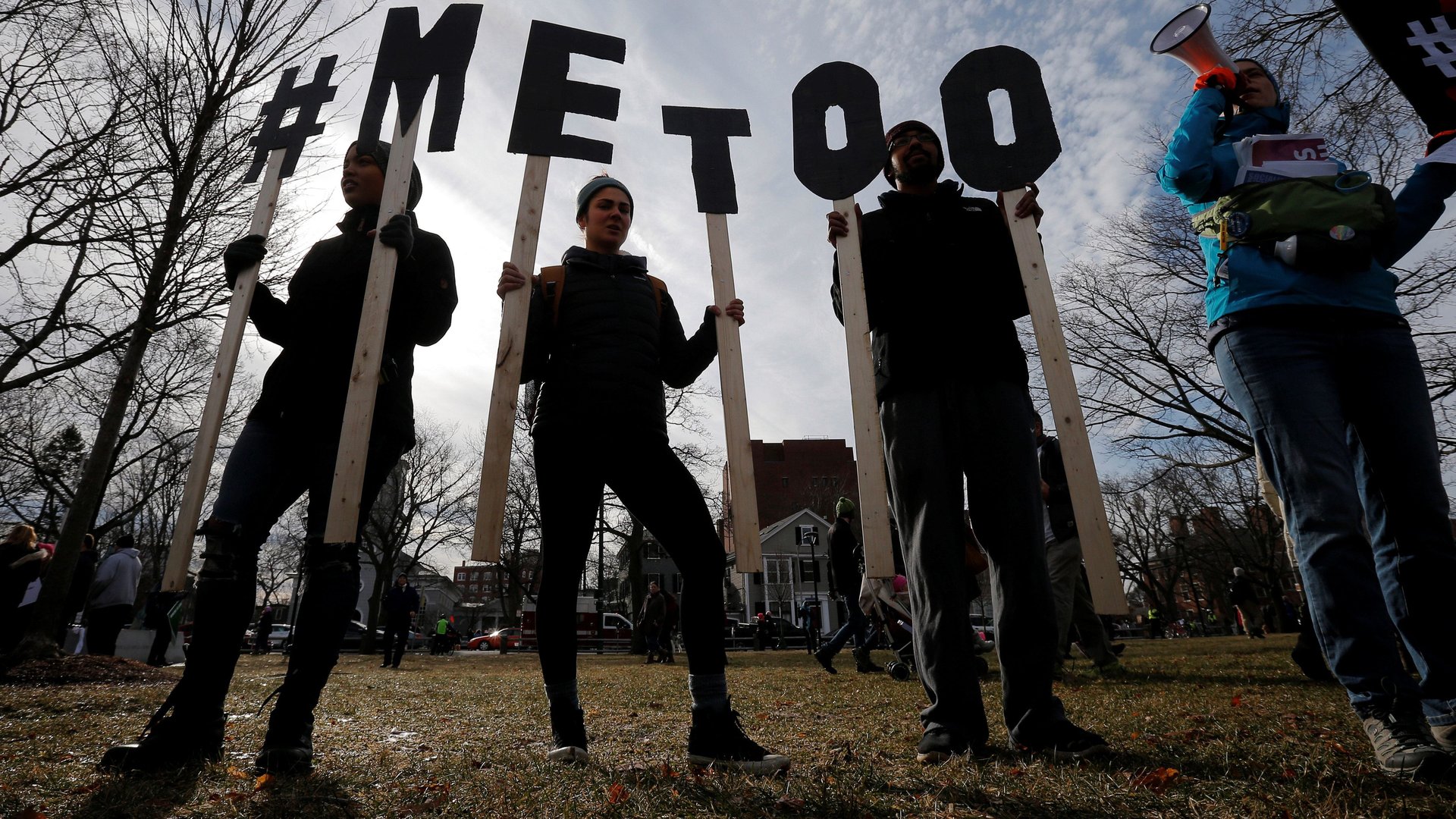#MeToo is not about the fall of men
We’re suddenly witnessing a wave of attempts to rebrand men outed as sexual predators or harassers.


We’re suddenly witnessing a wave of attempts to rebrand men outed as sexual predators or harassers.
First, only nine months after admitting to masturbating in front of several women without their consent, comedian Louis CK dropped in on an open mic night at a New York comedy club. Then, former radio host John Hockenberry, who had allegedly inappropriately touched a female colleague, and made several sexually suggestive comments to others, wrote an essay for Harper’s magazine, casting himself as a misunderstood victim sent into exile.
Shortly thereafter, the New York Review of Books published the same genre of essay by the former Canadian radio host Jian Ghomeshi, who let it be known that at least one friend thought he should claim the title of first victim of #MeToo. (In the spring of 2016, Ghomeshi was acquitted of four counts of sexual assault and one charge of choking in a highly publicized trial. Women who had dated Ghomeshi described being punched in the head, slapped, and choked by him in acts he later claimed were consensual.) Then came New York magazine’s controversial profile of Soon-Yi Previn, which also served as a defense of her husband, Woody Allen, who has spent years battling allegations of molestation brought by his adopted daughter, Dylan Farrow.
Fortunately, others in the press aren’t having it.
Hockenberry’s essay was called “a cri de coeur of heartlessness” by Mike Pesca at Slate. He wrote: “It is a think piece by a man who is baffled as to what issue he needs to think about.”
The New Yorker’s Jia Tolentino warned that left-leaning publications were “helping to establish a liberal men’s-rights discourse in which all the old and terrible structures of male supremacy are rebuilt, coated with a veneer of independent thinking, and fronted by a tactical insistence that everyone involved has the utmost respect for women, is absolutely on the side of equality, and is just asking the complicated questions that must be asked.”
The fact that Louis CK believed he could pull off a surprise set, and used it to riff on the phrase “clean as a whistle,” because, hey, he pointed out, rape whistles are not clean, sparked fresh, incredulous outrage. Critics of the Previn/Allen piece pointed out that its author has been friends with the famed director for 40 years.
Ghomeshi’s essay, meanwhile, was found wanting of accuracy, specificity, and heartfelt ownership of the suffering he had caused. Media critic Jess Brown, founder of the Toronto-based Canadaland, fact-checked the piece and found numerous lies by omission. He also commented on the semi-monthly publication’s framing of the trio of stories featured on its cover that week, including Ghomeshi’s. Brown wrote:
“The New York Review of Books presented Ghomeshi’s essay under the grave cover headline ‘THE FALL OF MEN.’ But the fall of Jian Ghomeshi is not indicative of the fall of men, mankind, masculinity, or anything so dire. It was the fall of one man who, by his own admission, was hurting people and abusing his power, and who, by the accounts of 23 women and one man, was a violent sexual predator.”
Comedian Aparna Nancherla expressed a similar sentiment on Sunday (September 16), as chatter on social media turned to the allegations facing Brett Kavanaugh, US president Donald Trump’s nominee to the US Supreme Court. Christine Blasey Ford, a scholar in California, accused Kavanaugh of drunkenly assaulting and attempting to rape her at a party in the 1980s, when they were in high school. He allegedly covered her mouth to keep her from screaming. In conversations online, some people seemed to suggest that boys just did that kind of thing. Nancherla made a request:
In the context of where #MeToo is right now, the distinctions drawn by both Brown and Nancherla feel critical, not only because we want to properly characterize the alleged perpetrators of specific charges, but also because suggesting that the fall of a few men represents the fall of men in general is a disservice to the #MeToo movement. It aims to discredit the albeit messy and imperfect progress of #MeToo as the work of indiscriminate extremists, rather than an important, thoughtful process founded on the principles of inclusion.
To ask for more intention in the language we use is not the same as the much-maligned #notallmen argument , because the former is not defensive. Rather than attempt to derail an important conversation, it suggests steering with precision. It doesn’t preclude criticizing the uglier aspects of masculinity and the toxic culture that breeds predators and enablers. Rather, it acknowledges that being a garden-variety drunken bro is not the same thing as being a drunken bro who violently attacks people.
#MeToo is about the rise of women’s voices and the end of shame. It is about the recovery of women’s buried histories and achievements, and about healing. It is about removing dangerous people from positions of power and dismantling the patriarchal power structure, or any structure that protects abusers, as well as a ton of other ideas.
“#MeToo is about the fall of a brand of masculinity that imprisons all men, even if they aren’t predators themselves, while victimizing all women, even if they aren’t the survivors of any given assault,” says Leah Fessler, my colleague at Quartz at Work who writes regularly on gender, intersectionality, and power. “The destruction of toxic masculinity liberates all people—men and women.”
#MeToo can be defined in many ways, but Brown and Nancherla are right. It’s not about the fall of men or boys.